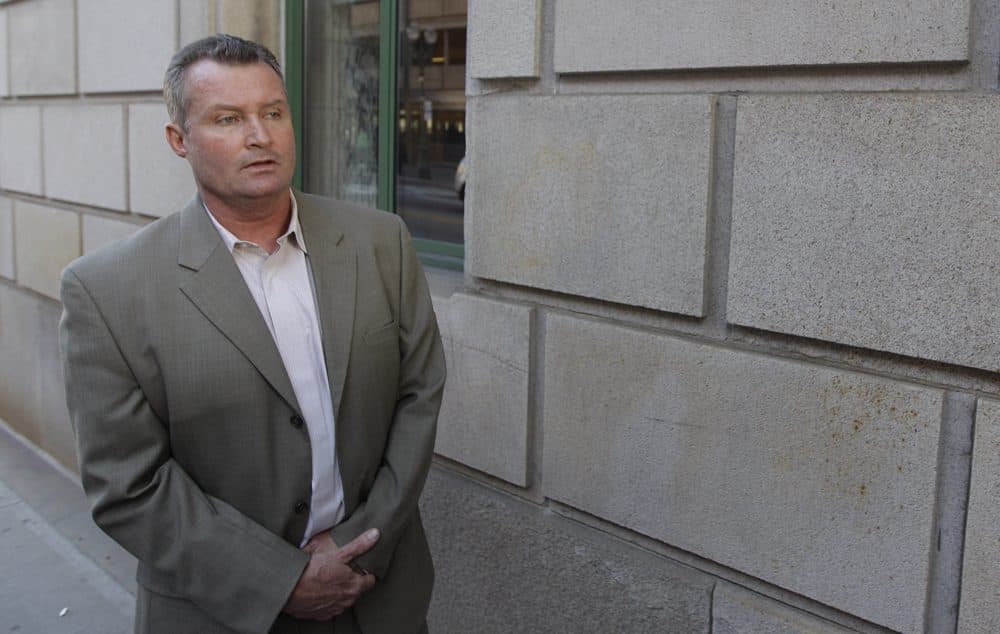Advertisement
Former Probation Commissioner Guilty Of Racketeering, Mail Fraud

Former state probation commissioner John O'Brien was convicted Thursday of rigging the department's hiring process to favor politically-connected applicants over those who were more qualified.
The guilty verdict on charges of racketeering and mail fraud came after seven days of deliberations in a case that focused attention on the patronage culture in Massachusetts state government.
The jury also convicted one of O'Brien's former deputies, Elizabeth Tavares, of racketeering and mail fraud. Another former official, William Burke, was convicted of a racketeering conspiracy charge but acquitted of mail fraud.
O'Brien's wife, Laurie, fainted as the verdict was read and was taken to a hospital as a precaution.
Federal prosecutors argued during the more than two-month trial that the defendants created a "sham" system to make it appear candidates were being hired for jobs in the probation department on merit, when in fact they were getting jobs because they had been sponsored by powerful state lawmakers.
"Bottom line: The evidence showed and clearly the jury agreed, that this case was about a fraud perpetrated by Mr. O'Brien and his deputies on the citizens of (Massachusetts)," U.S. Attorney Carmen Ortiz said after the verdict.
"Mr. O'Brien certified time and time again that he hired probation officers solely based on merit, when the reality and the evidence was in court that time and time again, he hired those who were politically connected," she said.
Attorneys for all three defendants said they would appeal.
"We respect the jury's verdict, even if we disagree with it," said Stellio Sinnis, O'Brien's lawyer. He predicted his client would be "vindicated" in the end.
The racketeering charge against O'Brien contained several so-called "predicate" acts, including bribery and illegal gratuities. The jury said prosecutors did not prove the bribery allegations, but did prove some illegal gratuities.
No legislators were charged in the case, though prosecutors asserted at trial that Democratic House Speaker Robert DeLeo had been involved in an alleged scheme to trade jobs at a newly-created electronic monitoring facility in exchange for support from other lawmakers during his bid for the top post in the House.
Advertisement
Ortiz would not directly answer questions from reporters about why her office did not seek charges against DeLeo or any other lawmakers, except to say prosecutors went where the evidence led them.
In a statement, DeLeo said he respected the jury's verdict while noting the panel's rejection of the bribery allegations.
"The jury's verdict confirmed what I have been saying all along: that I never participated in a conspiracy with any of the defendants and that I never traded probation jobs for votes," the Democratic speaker said.
The issue had roiled Beacon Hill for years. In 2010, an independent counsel appointed by the state's highest court issued a scathing 337-page report pointing to a corrupt hiring and promotion process in the department and prompting passage of a law that created a standardized hiring system intended to remove political influence.
Vincent Lisi, special agent in charge of the Boston FBI office, said it was one of the most complex political corruption cases ever tried in Massachusetts.
"I think this should send a message to any corrupt public officials that there is nothing that is going to get in our way of identifying and bringing them to justice," Lisi said.
U.S. District Court Judge William Young told jurors at the outset of the trial and again before deliberations that patronage - which he defined as getting a job because of who you know, rather than what you know - is not by itself a crime, and that the government would have to prove that O'Brien knowingly committed fraudulent acts and that Tavares and Burke aided and abetted in those actions.
Defense attorneys contended that no laws were broken and that O'Brien never knowingly gave a job to an unqualified applicant. The defense also argued that hiring people with political connections was not a practice limited to probation and in fact was fairly common in the trial court, which had jurisdiction over probation hiring prior to a change in state law more than a decade ago.
Democratic Gov. Deval Patrick said after the verdict that the hiring practices in the probation department undermined confidence in government, but were corrected when they came to light.
"I want the public to know that the practices on trial are not the practices in place today," Patrick said.
Sentencing for O'Brien, Tavares and Burke was scheduled for Nov. 18. Each charge carries a maximum sentence of 20 years in prison and a $25,000 fine, though the actual penalties will likely be much less.
This article was originally published on July 24, 2014.